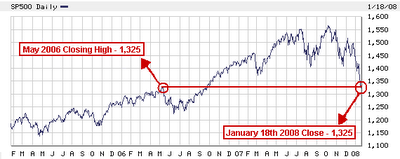Last weekend I attended some festivities for a friend's birthday that included dinner at the Landmark Buffet at the Ameristar Casino and Hotel (ASCA) in St. Charles, Missouri. Along with spending some time with good friends, I was also especially interested to see how busy the casino was on a Friday night. If you simply looked at the stock prices of the major casino companies in the United States, you would have predicted the place would be empty. Gaming stocks have been crushed lately on consumer spending worries. ASCA stock, for example, is down about 45%, from a high of $38 to the current quote of $21 per share.
Such large drops are fairly surprising given that gaming stocks are widely believed to be fairly recession-proof. Rather than take lavish vacations, or even hop on a plane heading to Vegas, people tend to scale back and just drive to a local riverboat casino instead. Despite the typical feeling that gaming holds up okay in recession, the casino stocks this time around have really taken it on the chin, so investors are clearly betting that this time is different.
Surprisingly, the Ameristar Casino was as crowded last Friday as I have ever seen it. At the buffet, for example, people are still standing in line for at least an hour for a $21.99 crab leg, steak, and shrimp dinner. After seeing such a large crowd, I came to the conclusion that the health of the consumer likely depends largely on where the person lives. Here in the Midwest, the housing market downturn has been less severe because it never really got crazy to start with. Compared with hot areas like California, Nevada, Arizona, and Florida, states like Missouri had much more subdued housing speculation.
The result of that is that things aren't that bad here. You don't hear about huge numbers of foreclosures or see evidence that the consumer is largely tapped out. The main problem here with respect to housing is simply a supply-demand imbalance. There is still a decent amount of building going on, in the face of high levels of for-sale signs out already, so houses aren't selling. However, people are simply sitting on them, reluctant to lower prices to motivate buyers, much like other places across the country. But without extreme speculative activity, the negative impact on consumer spending does not appear to be as drastic as other places across the nation.
How can we make investment decisions based on this? Well, my opinion is that many consumer related stocks have been beaten down way too much. Companies focused on the roughest housing markets will likely see the brunt of the negative impact. Other areas such as the Midwest will likely hold up well on a relative basis. For a company like Ameristar, which owns properties in Missouri, Nebraska, and Mississippi, things might wind up being okay.
Additionally, the upscale consumer sector should still do relatively well. Sure, things will slow down, but the high end of the market will drop off less than the lower end, and likely will rebound faster once things turn around. After all, rich people probably aren't scaling back too much due to elevated inflation levels.
One other area I think is poised to hold up well is the restaurant sector. Wall Street is bracing for people to stop eating out during the current economic downturn, but I would argue that eating out is due more to a secular shift in behavior than a bi-product of easy credit. People nowadays work longer hours than they used to and have less time to make dinner every night. I'm not saying dining spending won't drop when things get tough, but I think if you look at the hits the stocks have taken and what that implies about business expectations, things won't be nearly as bad as investors are pricing into the stock prices of restaurant chains.
All in all, I think investors should differentiate between the varying degrees of consumer stocks. A lower end company operating in California or Florida is going to fare differently than a high end company in the Midwest. A Vegas casino might not do as well as one based in St. Charles, MO in uncertain economic times. Traffic declines at a clothing retailer will likely be more dramatic than at a restaurant chain, if indeed eating out is a decision made for convenience more than monetary reasons. A new wardrobe is much easier to postpone than making time to prepare dinner at home.
As we allocate money to the consumer discretionary sector, it might serve us well to think about these things.
Full Disclosure: No position in ASCA at the time of writing

